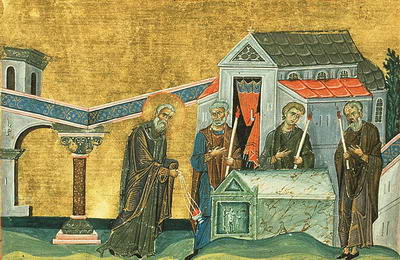
Saint Maruthas was Bishop of Tagrith (Martyropolis), a city which he founded between the Byzantine Empire and Persia. He was famed for his knowledge and his piety, he wrote about the martyrs, and he suffered for his faith in Christ under the Persian emperor Sapor. He also left behind other works in the Syrian language, among which the most famous are: "Commentary on the Gospel," "Verses of Maruthas," "Liturgy of Maruthas" and "The 73 Canons of the Ecumenical Council at Nicea" (325) with an account of the acts of the Council.
In the year 381 St Maruthas participated in the Second Ecumenical Council at Constantinople, convened against the heresy of Macedonius. In 383, he attended the Council of Antioch against the Messalians.
During the years 403-404 St Maruthas set off to Constantinople to plead with the emperor Arcadius to protect Persian Christians. He was twice sent by the emperor Theodosius the Younger to the Shah Izdegerd to secure the peace between the Empire and Persia.
In the year 414 St Maruthas, having done his duty as envoy to the court of Izdegerd, persuaded the Shah to a favorable disposition towards Christians, and he assisted greatly in the freedom of Christians in Persia. He rebuilt Christian churches razed during the persecution by the Persian ruler Sapor. He also located relics of saints who had suffered martyrdom and transferred them to Martyropolis. He died there in 422. The relics of St Maruthas were later transferred to Egypt and placed in a skete monastery of the Mother of God.
Back

 Saint Maruthas was Bishop of Tagrith (Martyropolis), a city which he founded between the Byzantine Empire and Persia. He was famed for his knowledge and his piety, he wrote about the martyrs, and he suffered for his faith in Christ under the Persian emperor Sapor. He also left behind other works in the Syrian language, among which the most famous are: "Commentary on the Gospel," "Verses of Maruthas," "Liturgy of Maruthas" and "The 73 Canons of the Ecumenical Council at Nicea" (325) with an account of the acts of the Council.
Saint Maruthas was Bishop of Tagrith (Martyropolis), a city which he founded between the Byzantine Empire and Persia. He was famed for his knowledge and his piety, he wrote about the martyrs, and he suffered for his faith in Christ under the Persian emperor Sapor. He also left behind other works in the Syrian language, among which the most famous are: "Commentary on the Gospel," "Verses of Maruthas," "Liturgy of Maruthas" and "The 73 Canons of the Ecumenical Council at Nicea" (325) with an account of the acts of the Council.